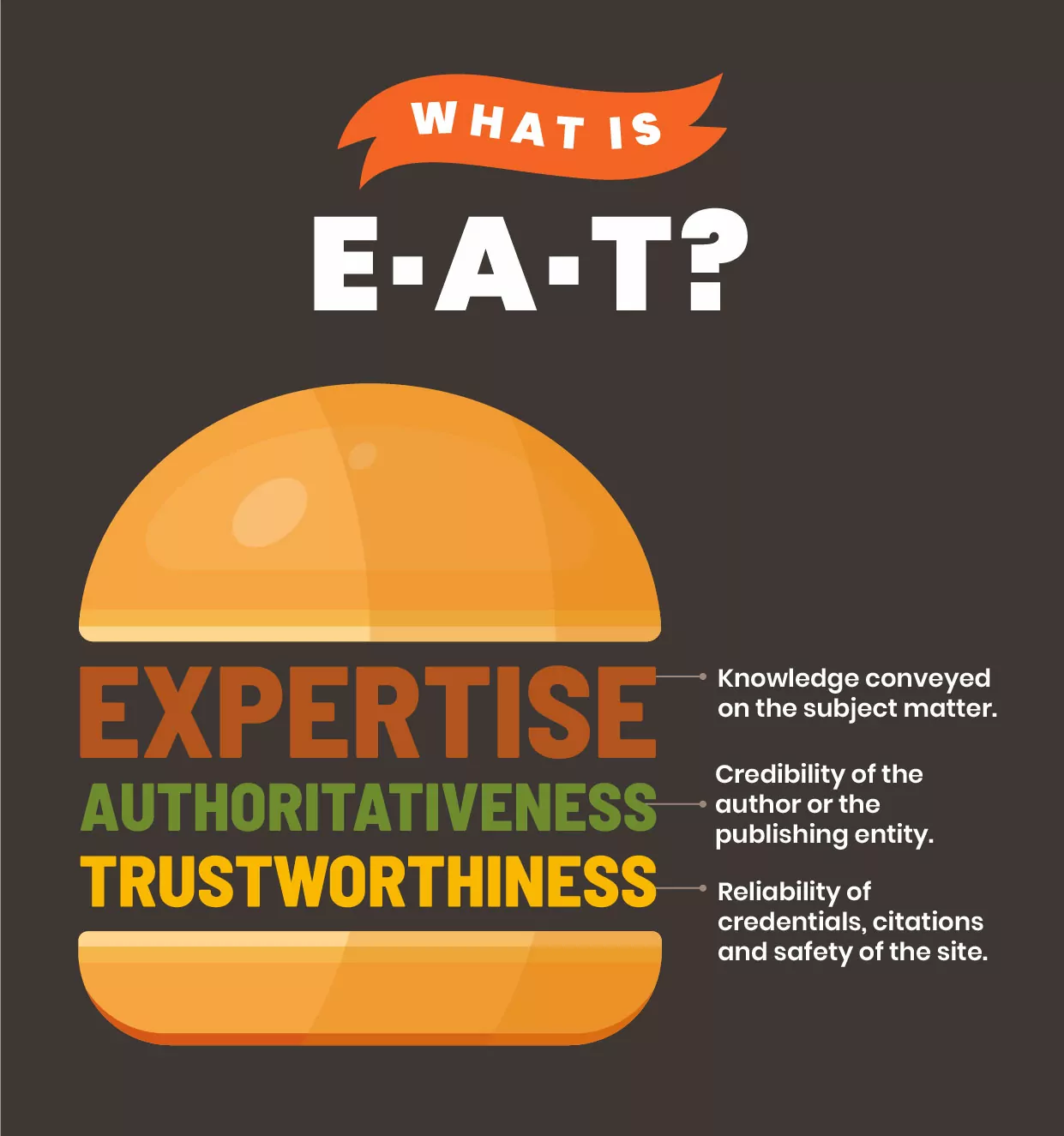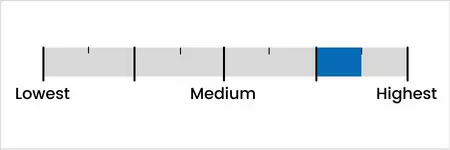Why is E-A-T Important?
What is E-A-T?
How Do I Build E-A-T?
What Results Can You Expect with E-A-T?
Part 3 of SEO Strategy for the Rest of Us
A series explaining SEO strategy so business leaders can be more effective in search
The days of adding targeted keywords to a webpage and calling it “optimized for search engines” are long over. In recent years, Google has shown it strongly favors websites that have expertise, authoritativeness, and trustworthiness (known as E-A-T or EAT), which has truly become a requirement to be successful in SEO. In this article, we’ll walk through what is E-A-T and why it’s important to your performance in search engine optimization and content marketing.
Why is E-A-T Important?
Have you ever thought: “Why am I not ranking for __________ targeted keyword?” Most of the time, the reason is simple: “You haven’t provided the best answer AND built enough E-A-T yet. In Google’s eyes, you are not seen as an expert, an authority, or a trusted source, and therefore, don’t deserve to rank higher in search engine results. Harsh, but true.”
Why is E-A-T important? You’ll need E-A-T if you want to:
- Increase organic search traffic and leads
- Reduce your dependency on paid placement
- Become a thought leader for specific content and get your viewpoint higher visibility
- Increase the backlinks to your content from an authoritative source
How do you know when you need to build E-A-T?
If you’ve been creating and sharing great content regularly, but your search rankings are not budging – that may be a sign that you need to build E-A-T. It can be quite frustrating to business leaders and CMOs who’ve invested considerable resources into these efforts.
The internet is flooded with content, so yours has to be of extremely high quality and BETTER than competing content. Let’s talk first about the content. You need to provide the answers that searchers go to Google to find. It is about much more than proper grammar and zero typos (that’s a given). User satisfaction is a strong signal Google is trying to measure and may consider bounce rate, average time on page, and a number of other indicators. While it is debated in the SEO industry exactly which factors Google uses or does not use, it is clear Google is able to measure to some extent when the user is satisfied. So, how do you make sure the user is satisfied? Your content needs to answer the searchers’ needs fully, leaving no questions unanswered.
Your website must offer a great user experience. Webpages and blog posts should be easy to skim, highlight key information at the top, and incorporate video, audio, and images to make it visually engaging. And of course, speed matters – each page must load quickly to perform well.
Your content must outshine your competitors. Spend time conducting a competitive content analysis:
- What questions did they not answer? What questions are they answering that you are not?
- What topics did they not cover?
- How can you expand on what they’ve written or take a different viewpoint?
- How can your content be more visually appealing – adding photos, infographics, audio, or video?
- What ways can your content be more in-depth on a similar topic?
- Is your user experience mobile-friendly and engaging?
Great content isn’t enough
You can create the best piece of content on a topic but still not rank in Google because content by itself is not enough. In addition to the content being excellent, Google is looking for proof of your expertise. Google actually has human quality raters who may rate the quality of your page from lowest to highest.
What is E-A-T?
E-A-T stands for Expertise, Authoritativeness, and Trustworthiness. Google says that E-A-T is “very important” and E-A-T guidelines tell Google’s human quality raters how to evaluate whether the content is of high quality.
 Google E-A-T: Expertise, Authoritativeness, and Trustworthiness
Google E-A-T: Expertise, Authoritativeness, and Trustworthiness
The following is taken directly from Google’s Search Quality Evaluator Guidelines:
3.2 Expertise, Authoritativeness, and Trustworthiness (E-A-T)
The amount of expertise, authoritativeness, and trustworthiness (E-A-T) is very important. Please consider:
- The expertise of the creator of the main content
- The authoritativeness of the creator of the main content, the main content itself, and the website
- The trustworthiness of the creator of the main content, the main content itself, and the website
According to Google’s Quality Rater Guidelines, the most important factors in rating a page are:
- The purpose of the page
- E-A-T
- Content quality
- Information about the website and the author of the content
- Website and author reputation
E-A-T is part of all five factors above. Basically, Google quality raters try to determine if you’re a true subject-matter expert and rate the quality of your content from lowest to highest.

Google Quality Rater Scale
Here’s what they may look for:
Credentials that may determine your expertise
- Published resumes or online profiles – universities, degrees, certifications, and years of experience
- Published articles and mentions by media, industry groups, influencer blogs, and other websites
- Published research – industry studies, research papers, or published work in industry journals
- Industry speaking – conference panels, workshops, or webinars
- Industry awards, board roles, or participation in industry working groups
- Authored articles, podcasts, videos, guides, reports, white papers, and ebooks
- Connections or associations with other known experts
External validation to determine authoritativeness
- Backlinks or citations from authoritative websites
- Content author looks like an expert authoritative source
- Reviews on Google, Yelp, or Better Business Bureau
- Mentioned online (websites and social media) by industry association, media or influencer
- Listed in industry or trade association directories
- Website has a good user experience – easy to navigate, loads quickly, and find useful answers
- Website has quality content – what users are searching for and free of grammar errors or typos (we’ve seen it can be problematic when writers are not writing in their native language)
Website factors that may determine trustworthiness
- Proper web security (HTTPS, current SSL certification, site hasn’t been hacked, etc.)
- Doesn’t appear to be spam (lots of ads, broken links, keyword stuffing, low-quality backlinks, etc.)
Google quality raters have even higher standards for content that may impact one’s health or money: Your Money Your Life (YMYL) content. For example, if you’re sharing medical content, Google may check to see if you have an MD, where you went to medical school, and review doctor rating sites.
The debate within the industry on E-A-T
Many aspects of E-A-T are clearly important components of the algorithm, which is the only way Google can effectively evaluate trillions of web pages.
While Google’s Gary Ilyes is quoted saying, “there’s no internal EAT or YMYL score” and Google Search Central saying “rater data is not used directly in our ranking algorithms,” these statements don’t go as far as saying E-A-T is not an important factor in Google’s algorithm. In fact, E-A-T is mentioned 129 times in Google’s General Guidelines as of January 20, 2022, and even in Google’s own description of its Broad Core Algorithm Updates, you’ll see aspects of E-A-T infused throughout.
How Do I Build E-A-T?
Trusted brands such as Mayo Clinic, Cleveland Clinic, or Johns Hopkins already have a high level of E-A-T and you’ll consistently see them near the top of annual SEO winner’s lists such as those done by SISTRIX. But it’s more challenging when you’re not the brand leader since it may take years to build E-A-T – making it the hardest SEO issue to solve.
You cannot fake being authoritative
Wondering what you can do to build E-A-T quickly? You’ll need to start by having true subject-matter experts (SMEs) – the importance of this cannot be emphasized enough. Then, rely on the deep knowledge of your SMEs to create high-quality content on the topics that people are looking for.
Figure out who the SMEs are in your company. Consider whether they’ll be perceived as experts in Google’s eyes. Is there sufficient evidence online that validates their expertise? When you don’t have true SMEs within your company, you may need to hire SMEs to author your content.
SMEs are some of the busiest people but that’s who your audience and Google want to hear from. It can help take some of the burdens off of them by carving out time regularly to interview them and help them create the content. Many agencies, including us, partner with you to draft content from SME interviews to streamline the content creation process.
Create more content… and better content
There is a correlation between more content and better organic results but the frequency is never enough. You’ll need content better than other content indexed by Google. Start by asking, are our SMEs creating content that our audience needs? Is it better content than what others have published on this topic? When you can answer “yes” to both, your content will likely be linked to other websites. Gaining this external validation builds your E-A-T and boosts your SEO performance. Don’t limit yourself to publishing only on your own website. Look for opportunities to share your SME’s expertise on other high-quality sites.
Evaluate your authoritative assets
We’ve seen a number of companies that have authoritative assets that they may be overlooking. Take time to inventory all of your assets – written, image, audio, and video assets – including ones that your team developed on their own, such as research, presentations, webinars, methodologies, documentation, or videos. You just may find that these assets would be great content to repurpose and publish.
Make quality content publicly available
It is common practice to place valuable content behind a wall where your audience must provide an email to download it. While it may be effective for lead generation, it actually hurts your efforts to build E-A-T. Google cannot view this content in most cases, and a short synopsis is usually not detailed enough to perform well. Make sure you have plenty of quality content that is easily accessible by your audience – and Google.
What Results Can You Expect with E-A-T?
We’ve seen clients increase organic traffic by more than 800% and quadruple their leads and conversions by improving their E-A-T. While not every case study is this dramatic, the results can be transformative:
- Significantly higher organic search rankings
- Easier and even faster sales – from lead to close
- Higher brand awareness and credibility
- Becoming a highly visible thought leader
Reach out today to learn more about building E-A-T as part of your SEO strategy.
You may have missed
Part 1: Embrace the Long Tail in Your Keyword Strategy
Part 2: Align Your Site Structure with Your Keyword Strategy

